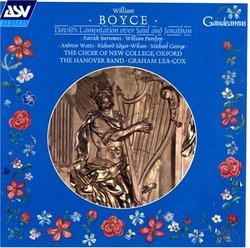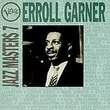| All Artists: William Boyce, Graham Lea-Cox Conductor, Hanover Band, William Purefoy, Richard Edgar-Wilson, Andrew Watts, Michael George Title: David's Lamentation Over Saul & Jonathan Members Wishing: 0 Total Copies: 0 Label: Gaudeamus Release Date: 11/28/2000 Genre: Classical Styles: Opera & Classical Vocal, Historical Periods, Classical (c.1770-1830) Number of Discs: 1 SwapaCD Credits: 1 UPC: 743625020823 |
Search - William Boyce, Graham Lea-Cox Conductor, Hanover Band :: David's Lamentation Over Saul & Jonathan
 | William Boyce, Graham Lea-Cox Conductor, Hanover Band David's Lamentation Over Saul & Jonathan Genre: Classical
|
Larger Image |
CD DetailsSimilar CDs
|
CD ReviewsA voice teacher and early music fan George Peabody | Planet Earth | 04/11/2009 (5 out of 5 stars) "A WORLD PREMIERE RECORDING YOU DON'T WANT TO MISS!
This disc includes: "David's Lamentation over Saul and Jonathan" and a small-scale 'St. Cecelia's Day' ode as well as two arias and a recitative from the earlier London version of the 'Lamentation'. William Boyce(1711-1779) wrote this work in 1736 at the age of twenty-four years. It is a beautifully crafted piece introduced by a deeply affecting two-movement Overture in G minor whose initial gesture momentarily recalls one of Bach's great laments. John Lockman, a poet, was the librettist for this work having written a poem 'David's Lamentation over Saul and Johnathan'. Lockman's biblical source for his libretto was in Samuel, Chapter one, and it tells the story of the death of Saul slain by the Amalekite, and of David's reaction. One notable feature of this work is that there is no 'dramatic personae'. The Chorus acts throughout as in Greek Tragedy, commenting on events and providing spiritual and moral reflections, as well as pacing the drama by suspending it at certain moments. In the recitatives Boyce requires the soloist to cope single-handedly with both narration and dialogue between the characters as the story unfolds. The soloists, therefore, by turns take their roles as narrator or protagonist as the drama progresses towards the musical and emotional heart of the work- a duet of sublime beauty, 'Sad Israel, thy beauty's pride'. Solo violin and voices here begin David's 'lament'. Boyce sustains the melancholy, sometimes broodingly intense character of this dramatic scene (not really an Oratorio) wonderfully well, punctuating the sections of an overly 'lament' character with some vigorous passages of 'accompagnato', in which the mighty shadow of Handel is present. The "Ode on St. Cecelia's Day is found in one version only and was written at about the same time as the 'Lamentation'. It is short for this genre, but covers, in abridged from, the elements of the English St. Cecelia ode of the 17th and early 18th centuries. Their purpose was to survey the influence of the power of music in the affairs of man, allowing the composer opportunities to explore various emotions such as love, war and peace before bringing in St. Cecelia at the end. Although I enjoyed "David's Lamentation" very much, this small ode of St. Cecelia charmed me and mesmorized me from beginning to end. It is well crafted and is really enhanced by the presence of Michael George, bass, who sings one of the most fabulous and exciting arias I have ever heard (shades of Handel!) I was captivated from beginning to end, and of course his voice is so powerful and resonant, his diction crystal-clear and his emotional investment great, that I can't thing of anyone who is into this genre, that would not be excited upon hearing it. The trio with boy soprano,Patrick Burrowes, William Purefoy and Michael George was truly memorable as were the choruses, so beautifully rendered by the New College Choir. An outstanding performance herein by the:Hanover Band, the Choir of New College, Oxford and the following skilled soloists: Timothy Roberts,Harpsichord- Richard Edgar-Wilson,Tenor- Michael George, bass baritone- William Purefoy, alto- Andrew Watts, countertenor- and Patrick Burrowes, boy soprano. The singing of the soloists is superb, with flawless diction, exquisite tone quality and dramatic intensity. The same can be said of the New College Choir, who is always nigh unto perfection and the Hanover Band as always solid and secure in their playing. For the Early Music Lover especially this is GREAT ENTERAINMENT!!!! In short, this is a WORLD PREMIERE RECORDING and if the overture alone does not tempt you, surely the poignant chorus "For Saul, for Jonathan, they fast, they weep" should do the 'trick'! Just a closing comment that may help you to mentally place this in a musical category. It is described by some musical historians as a Cantata for Soloists, Chorus and Orchestra. " |

 Track Listings (30) - Disc #1
Track Listings (30) - Disc #1


